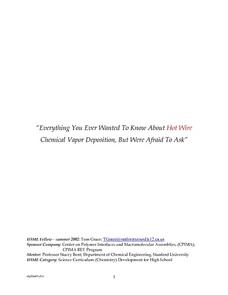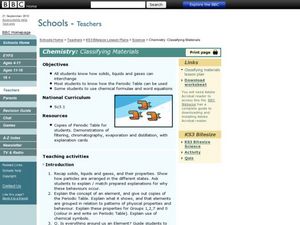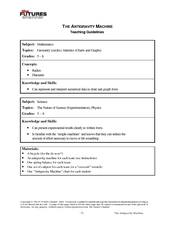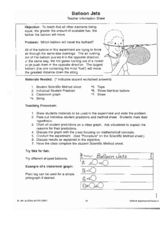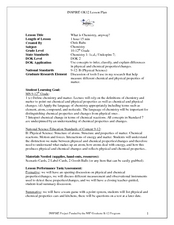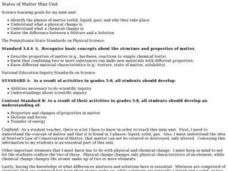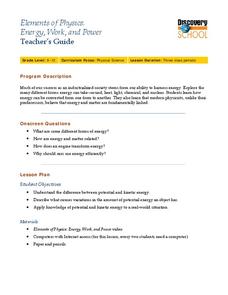Curated OER
Everything You Ever Wanted To Know About Hot Wire Chemical Vapor Deposition, But Were Afraid To Ask
To wrap up your year of general chemistry, have lab groups compete in a tot wire chemical vapor deposition (HWCVD) competition. With their foundation in chemical nomenclature, stoichiometry, and gas laws, each group completes several...
Curated OER
The Airplane
Students demonstrate the Bernoulli Principle, review the influences that affected the Wright Brothers, and make and modify paper airplanes. This amazing lesson plan has an excellent structure, and very clear plans for the students to...
Curated OER
What is an Atom?
Third graders understand that the smallest particle is an atom. In this matter lesson, 3rd graders make a piece of aluminum smaller and smaller to see that what's left is still aluminum. Students recognize that cutting into smaller...
Curated OER
Nonmetals
High schoolers research about the chemical processes involved in cave formation. In this chemistry lesson, students draw or find a cave picture with stalagmites and stalactites online. They write a brief caption and share them with the...
Curated OER
Other Metals
Young scholars identify the properties of transition metals. In this chemistry instructional activity, students research facts and uses of one aluminum product they choose. They create an advertisement highlighting aluminum's useful...
Curated OER
Chemistry: Classifying Materials
Young scholars classify materials. In this chemistry lesson, students examine the properties of solids, liquids, and gases. Young scholars discover the elements, compounds, and chemical symbols.
Curated OER
Minerals And Their Uses
In this minerals learning exercise, learners will review the four physical characteristics used to identify a mineral: streak, color, size, and hardness. Students will also understand the Mohs Hardness Scale. This learning exercise has...
Curated OER
The Anti-Gravity Machine
Learners examine physics by completing a bicycle experiment in class. In this gravity instructional activity, students measure the characteristics of different bicycles and compare their different race times. Learners utilize a...
Curated OER
Balloon Jets
Students investigate how fuel amount affects the distance traveled by balloons. In this physics lesson, students collect data and create a pictograph. They interpret data and formulate a conclusion.
Curated OER
Stellar Fingerprints: the Spectra of Stars
Students explain how an element can be identified using emission spectra. They relate the emission spectrum of hydrogen to its absorption spectrum and identify hydrogen absorption lines in the spectrum of stars.
Curated OER
Molecule Models: Model to Formula and Model to Formula
In this science molecule models worksheet, student convert 8 molecule models to chemical formulas and 8 chemical formulas to molecule models.
Curated OER
Nuclear Reactions
Starting with a recap of atomic structure, these slides continue by comparing different isotopes of uranium and explaining which are stable and which have a decay period and emit alpha or beta particles. Gamma decay is just mentioned on...
American Museum of Natural History
Atomic Mobile
Structure an activity around atoms. Learners use their knowledge of the parts of atoms—the protons, neutrons, and electrons—to build a model of a carbon atom. Scholars create a nucleus by using clay balls to represent the protons and...
Virginia Department of Education
Molar Volume of a Gas
What is a chemist's favorite plant? Stoichiome Tree! Scholars produce hydrogen gas by reacting magnesium with hydrochloric acid. Then they calculate the molar volume of the gas produced before answering assessment questions.
Virginia Department of Education
Solution Concentrations
What happens when you combine 6.022 times 10 to the 23 piles of dirt into one? You make a mountain out of a mole hill. Scholars use dehydration to obtain percent composition and then calculate the molarity of the original...
Curated OER
Polymers all Over the Place
Students investigate properties of common molecules. In this chemistry lesson, students construct polymer models to gain a better understanding of the properties of polymers.
DiscoverE
Build a Roller Coaster
Let the good times roll as young thrill seekers build a roller coaster on school grounds. Future engineers design and build a roller coaster from flexible tubing. The roller coaster is for a marble, so there will be plenty of room to let...
Curated OER
CEENBot Soccer
Students research the history and uses of the different elements in the periodic table. In this chemistry instructional activity, students explain the significance of an element's valence electrons. They create a multimedia presentation...
Curated OER
What Is Chemistry, Anyway?
Students differentiate physical and chemical change. In this chemistry lesson, students list examples of those changes. They apply what they learned in a Jeopardy style team game.
Curated OER
Newton’s Laws of Motion
Eighth graders explore the three laws of motion. For this physics lesson, 8th graders observe teacher demonstration and explain what happened in terms of Newton's Laws. They complete worksheet at the end of the lesson.
Curated OER
Catering Middle-School Science: Monomers, Polymers, and Macromolecules
Students investigate foods. In this biology lesson plan, students will conduct testing on different types of foods as they learn about different molecules that make them up. Students will also learn about the shapes of the molecules.
Curated OER
Chemical Composition of American Coins
High schoolers investigate the chemical composition of pennies dated 1983 or later. In this chemical composition of American coins lesson plan, students scratch the surface of the penny to expose the zinc core. They put the penny in...
Curated OER
States of Matter Mini-Unit
Middle schoolers identify he phases of matter (solid, liquid, gas), and why they take place. They comprehend what a physical change is and what a chemical change is. Students know the difference between a Mixture and a Solution.
Curated OER
Energy, Work and Power
Students examine the differences between potential and kinetic energy. In this physics instructional activity students view a video and apply what they learn about energy to apply it to real world situations.
